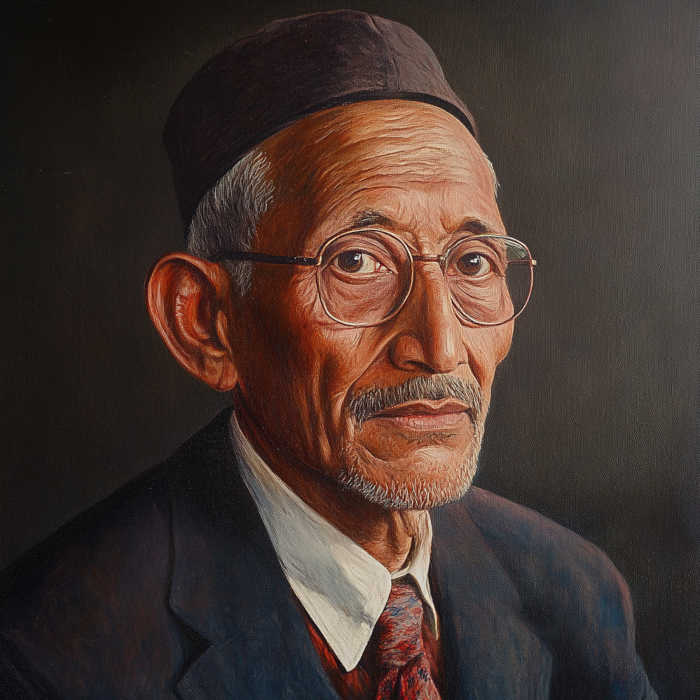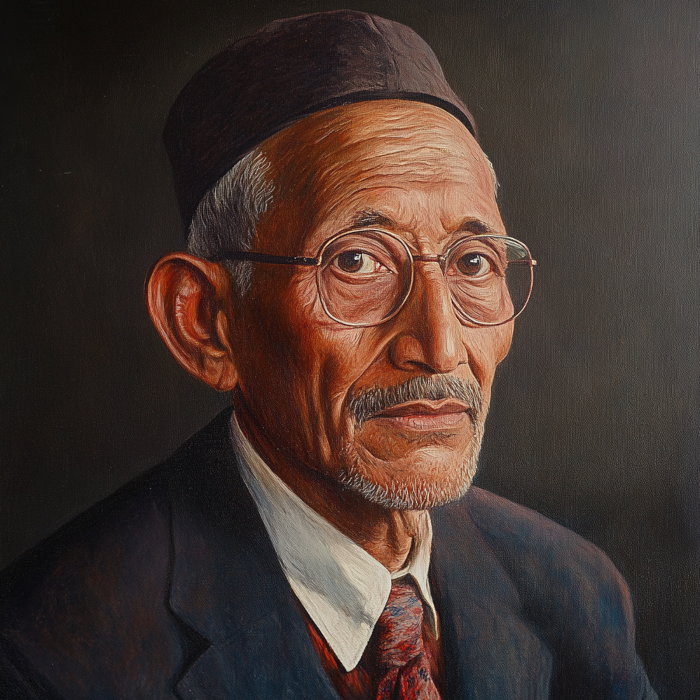


Bishweshwar Prasad Koirala, commonly known as B. P. Koirala (1914–1982), was a prominent Nepali politician, writer, and social democrat who played a key role in the establishment of democracy in Nepal. He served as Nepal's first democratically elected Prime Minister from 1959 to 1960 and was a leading figure in the struggle against the autocratic Rana regime and for democratic governance in Nepal. B. P. Koirala was also an accomplished novelist and essayist, whose literary works are highly regarded in Nepali literature. His contributions to politics and literature make him one of the most influential figures in Nepal's modern history.
Birth and Family Background: B. P. Koirala was born on September 8, 1914, in Dumja, in Sindhuli District, Nepal, into a politically aware family. He was the son of Krishna Prasad Koirala, a well-known political activist who was an early opponent of the Rana autocracy. The Koirala family had a strong tradition of opposing autocratic rule, and B. P.'s early exposure to political discussions and activism shaped his political beliefs and commitment to democracy.
Education in India: B. P. Koirala completed his early education in Varanasi, India, where his family had moved to escape political persecution by the Ranas. He went on to study at Banaras Hindu University, where he earned a degree in economics. He later studied law at the University of Calcutta and became a practicing lawyer. During his time in India, Koirala was deeply influenced by the Indian independence movement and became actively involved in politics.
Involvement in Indian Independence Movement: While in India, B. P. Koirala became involved in the Indian National Congress (INC) and took part in the Quit India Movement in 1942, which called for an end to British rule in India. His participation in the Indian independence struggle gave him experience in organizing protests and civil disobedience, and he formed connections with Indian leaders, including Jawaharlal Nehru. These experiences helped shape his vision of democracy for Nepal and gave him the skills he would later use in the fight against the autocratic Rana regime.
Founding of the Nepali Congress: In 1947, B. P. Koirala co-founded the Nepali National Congress, which later merged with the Nepali Democratic Congress to form the Nepali Congress (NC) in 1950. The Nepali Congress became the leading force in the struggle against the Rana dynasty, which had ruled Nepal as an autocracy since the mid-19th century. The party advocated for the establishment of a constitutional monarchy and democratic governance in Nepal.
Revolution of 1950–1951: B. P. Koirala played a key role in organizing the armed revolution against the Rana regime in 1950–1951, which was aimed at ending the century-long rule of the Ranas and establishing a democratic government. The revolution was supported by King Tribhuvan, who had fled to India to escape Rana control. The successful revolution in 1951 led to the fall of the Rana regime and the establishment of a coalition government, marking the beginning of a new political era in Nepal. B. P. Koirala became the Home Minister in the newly formed government and played an important role in drafting the country's new constitution.
First Democratic Elections: In 1959, Nepal held its first-ever general elections under a new constitution, and the Nepali Congress, led by B. P. Koirala, won a majority of seats in the Rastriya Panchayat (the parliament). B. P. Koirala was appointed as Prime Minister by King Mahendra, becoming the first democratically elected Prime Minister of Nepal.
Policies and Reforms: As Prime Minister, B. P. Koirala pursued a reformist agenda focused on social justice, land reform, and education. He sought to modernize Nepal's economy and infrastructure and worked towards improving the living standards of the Nepali people. He was also committed to reducing the power of the monarchy and establishing a fully functioning parliamentary democracy. B. P. Koirala's government made efforts to strengthen Nepal's relationships with neighboring countries, including India and China, while maintaining a policy of non-alignment in international affairs.
Ouster by King Mahendra: Despite his popularity and the reforms he introduced, B. P. Koirala's tenure as Prime Minister was cut short when, in December 1960, King Mahendra dismissed his government, dissolved the parliament, and established direct rule. The King justified his actions by citing the need to protect Nepal from political instability and external threats. B. P. Koirala and many members of his cabinet were arrested and imprisoned. The dismissal of Koirala's government marked the end of the brief experiment with democracy, and the Panchayat system, a partyless system of governance under the absolute authority of the monarchy, was established.
Years of Imprisonment and Exile: B. P. Koirala was imprisoned from 1960 to 1968, spending years in solitary confinement. After his release, he went into exile in India, where he continued to work for the restoration of democracy in Nepal. During his years in exile, he wrote extensively and remained active in the political struggle, rallying support from Nepali exiles and lobbying for international support for Nepal's democratic movement.
Return to Nepal and Advocacy for Democracy: In 1976, B. P. Koirala made a dramatic return to Nepal, calling for national reconciliation between the monarchy and democratic forces to address the country's growing political instability. He coined the phrase "national reconciliation policy" (Rastriya Melmilap), advocating for unity between the monarchy, political parties, and the people to establish democracy peacefully. Although he was briefly arrested upon his return, he was later released, and his call for national reconciliation gained significant support.
Influence on the Democratic Movement: B. P. Koirala's ideas of democracy and social justice inspired future generations of political leaders in Nepal. His writings, speeches, and political philosophy played a significant role in shaping the Jana Andolan (People's Movement) of 1990, which ultimately led to the restoration of multi-party democracy in Nepal and the end of the Panchayat system. His vision of a constitutional monarchy and parliamentary democracy became the foundation for the political system that emerged after 1990.
Acclaimed Writer: In addition to his political career, B. P. Koirala was an accomplished writer whose works are considered some of the most important in Nepali literature. He wrote novels, short stories, and essays that explored themes of love, social justice, human relationships, and the complexities of Nepali society. His literary works are notable for their deep insight into the human condition and their exploration of psychological and emotional struggles.
Notable Works: Some of B. P. Koirala's most well-known literary works include:
Themes and Legacy in Literature: B. P. Koirala's literary works often reflected his belief in social equality, individual freedom, and human dignity. His writings are considered timeless and continue to be popular in Nepal for their portrayal of the social realities of the time. Koirala's dual role as a politician and writer gave him a unique perspective on society, and his literature remains influential in Nepali culture.
Father of Democracy in Nepal: B. P. Koirala is widely regarded as the Father of Democracy in Nepal. His leadership in the struggle against the Rana autocracy, his role in establishing the Nepali Congress party, and his efforts to introduce democratic governance in Nepal have left an enduring impact on the country. He dedicated his life to the cause of democracy, social justice, and national unity, and his ideas have continued to influence Nepal's political landscape long after his death.
Advocate for Social Justice and National Reconciliation: B. P. Koirala's advocacy for social justice and his national reconciliation policy made him a unifying figure in Nepalese politics. His belief in working together across political divides to achieve national progress is remembered as an important part of his legacy, especially in a country that has faced significant political turmoil and polarization. His vision of a democratic Nepal that respects the rights of all citizens remains a source of inspiration for many.
Cultural and Literary Impact: In addition to his political legacy, B. P. Koirala's contributions to Nepali literature have had a lasting cultural impact. His novels, stories, and essays are still widely read and studied, and his exploration of themes such as love, identity, and social change has enriched Nepali literature. He is regarded as one of the finest writers in the Nepali language, and his works are celebrated for their depth and humanity.
B. P. Koirala passed away on July 21, 1982, in Kathmandu, Nepal. He was given a state funeral, and thousands of people came to pay their respects to the man who had fought tirelessly for their freedom and rights. His death marked the end of an era in Nepalese politics, but his ideas and vision have continued to inspire movements for democracy and social justice in the country.
B. P. Koirala was a visionary leader, social democrat, and cultural icon whose contributions to Nepal's political and literary heritage have left an indelible mark. As the country's first democratically elected Prime Minister, he played a key role in introducing parliamentary democracy and fighting against authoritarian rule. His advocacy for social justice, democracy, and national reconciliation has made him a beloved figure in Nepalese history. In addition to his political achievements, his literary works have enriched Nepali culture and continue to be celebrated for their exploration of the complexities of human life and society.
B. P. Koirala's legacy as the Father of Democracy in Nepal and a pioneering writer remains significant, and his life story serves as an inspiration for those seeking a democratic, inclusive, and just society. His contributions to both politics and literature make him a central figure in Nepal's modern history, and his impact continues to be felt in the country's ongoing journey toward democracy and progress.

We use cookies
We use cookies and other tracking technologies to improve your browsing experience on our website, to show you personalized content and targeted ads, to analyze our website traffic, and to understand where our visitors are coming from. Privacy Policy.